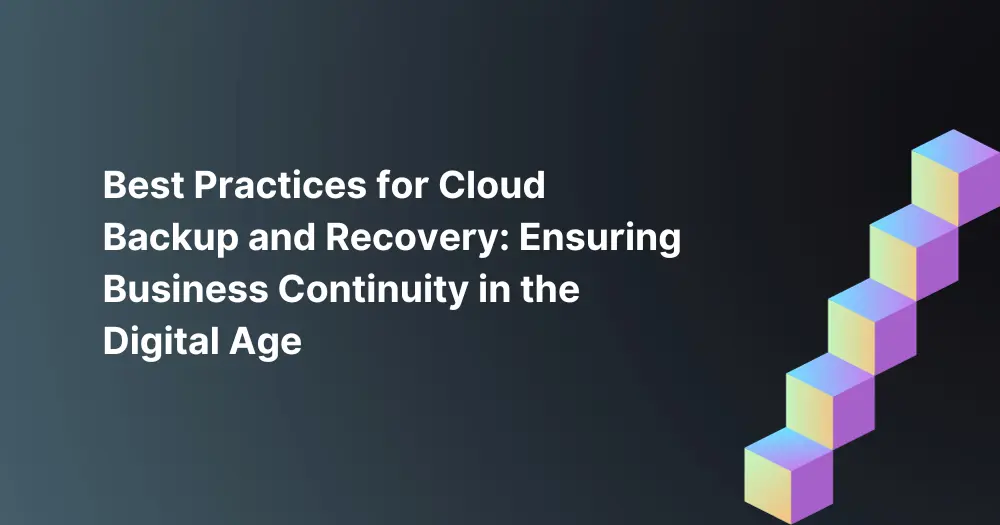Data is the backbone of any successful business today. It helps make informed decisions and provides valuable insights that can lead to growth and expansion. As a result, ensuring this vital asset’s protection has become a top priority for businesses.
In a recent report, nearly all businesses that suffer a major data loss are unable to fully recover, with an estimated 94% succumbing to the financial and operational repercussions.
While traditional backup methods, such as local storage, offer a sense of convenience, they can pose a threat to data security. These methods are susceptible to hardware failures, natural disasters, and human errors, all of which can leave businesses vulnerable to data loss. Hence, implementing a robust cloud backup and recovery strategy is crucial for business continuity and ensuring long-term success.
The Role of Cloud Backup and Recovery
Cloud backup and recovery services offer a comprehensive solution for your business to protect your valuable data. Storing backups securely in the cloud gives you peace of mind, knowing that your data remains safe and accessible in the face of various threats, such as hardware failures, cyber-attacks, and natural disasters. Reduce the risk of data loss, minimize downtime, and ensure business continuity, all while saving costs by leveraging cloud backup and recovery.
Best Practices for Cloud Backup and Recovery
Understand Your Data
Identify critical business data and systems, such as customer information, financial records, and operational systems. Prioritize these data based on its importance and relevance, factoring in interdependencies and regulatory requirements to develop a targeted backup plan that meets your business needs. Determine critical factors such as backup frequency, retention policies, and selecting appropriate cloud storage locations.
Automate Backup Processes
With manual backups being prone to errors and inconsistencies, automating your backup processes is a better option to ensure regular, reliable backups without the risk of oversight. Schedule automatic backups and incorporate automated testing procedures to verify your data backups’ integrity and reduce the risk of human error.
Ensure Data Security with Encryption
Implement encryption for both data in transit and at rest to safeguard critical data. Encryption adds an extra layer of defense against breaches by encoding data to make it unreadable to unauthorized individuals. Use a robust encryption algorithm and secure key management to keep encryption keys confidential and accessible only to authorized personnel.
Adhere to the 3-2-1 Rule
The 3-2-1 rule is a well-established and widely recognized strategy for data protection. It recommends creating three copies of your valuable data, each stored on two different media types, with at least one of the copies kept offsite. This approach provides a strong defense against data loss, whether due to hardware failure, human error, or unforeseen disasters.
Regular Testing and Monitoring
Implement monitoring tools to track the status of backup jobs, such as failed backups, missed backups, or backup job delays and identify potential issues before they become critical. With this information, you can immediately resolve the issue and prevent data loss.
Hand in hand with monitoring is proactive testing to maintain a resilient backup system. Conduct regular testing to identify potential issues before they escalate and ensure your backups are always ready to deploy when needed. This could be done through disaster simulations or data loss scenarios to test the effectiveness of your backup strategy and identify any weaknesses or gaps.
Implement Versioning and Incremental Backups
Versioning gives you a complete history of changes made to your data over time. Tracking every modification to your files allows you to easily restore them to a specific time, even if they have been modified or deleted since then. With incremental backups, only the modified portions of the data are saved since the last backup, ensuring you’re not repeatedly duplicating the same data.
Combining versioning and incremental backups allows you to easily restore any version of your files while minimizing the storage and bandwidth resources needed to maintain backups.
Software and System Maintenance
Regularly update your backup software, systems, and firmware to patch vulnerabilities and ensure compatibility with evolving technologies. Being proactive and staying on top of updates is necessary to protect your data rather than waiting until it’s too late when a malfunction or security breach has already occurred.
Implementing these best practices for cloud backup and recovery is an investment in the resilience and continuity of your business. The cloud service provider plays a huge role in your backup and recovery strategy. Look for a provider with robust security measures, high reliability, and transparent service-level agreements (SLAs). A reputable provider will ensure that your data is in safe hands and will significantly contribute to the success of your backup and recovery efforts.
BlackPoint IT provides secure, scalable, and reliable cloud services that meet your unique business needs. We believe in the power of collaboration and aim to be a trusted partner in your journey towards digital transformation. We will guide you through every step for a smooth transition to the cloud. Schedule a personalized consultation today!




